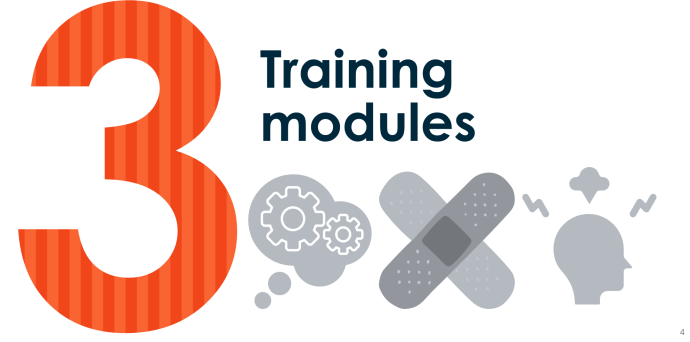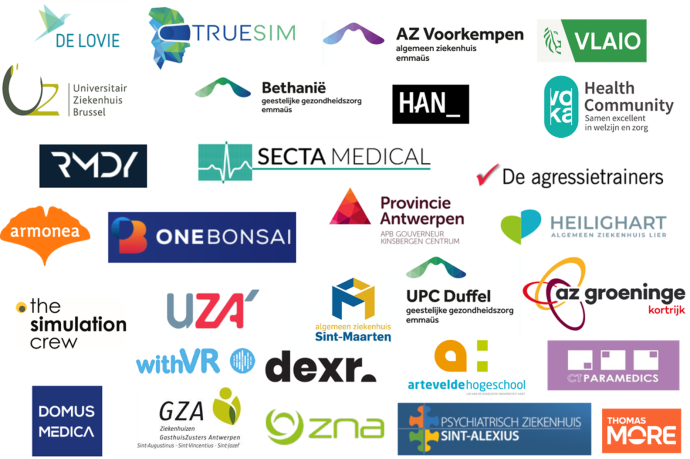Prevention and empowerment
Our goal is to increase the accessibility, effectiveness and feasibility of prevention in care and well-being. We do this by ...
Combining further training with a hectic work schedule and stressful working conditions is a huge challenge for nurses and healthcare professionals. Immersive technology via XR glasses, among other things, offers a potential solution to offer training courses more flexibly and tailor-made.
That is why Thomas More, in collaboration with technology and care partners, is developing, implementing and evaluating three modules in the areas of (1) clinical reasoning, (2) wound care and (3) dealing with aggression.
Nurses and healthcare assistants need to undergo regular further training to keep their knowledge of (medical) procedures up-to-date. However, they are faced with stressful conditions and high workloads due to understaffing and the increasing complexity within healthcare. This makes it difficult to allocate sufficient time and resources for additional training. Moreover, the current offerings of further training for healthcare providers are often perceived as expensive, time-consuming, and lacking flexibility in terms of scheduling. Immersive technology (ImT) could provide an innovative solution to these challenges.
Immersive technology (ImT) creates a sense of immersion in a new world through an artificial, virtual layer that replaces or adapts the real environment. This allows users to undergo training in various simulated situations using devices such as Virtual Reality (VR - where a fully virtual environment is simulated) or Mixed Reality (MR - where a digital layer is added to the real environment).
Offering simulation training through ImT helps overcome typical obstacles of traditional training, such as travel costs or time, the need for group training, and a lack of repetition opportunities. By offering individualized training, nurses and healthcare assistants can choose a suitable time to train, at their own pace, with opportunities for repetition as desired. And all this within a realistic simulated environment.
Thomas More is bringing together partners from healthcare institutions and immersive technology software developers to collaboratively develop, implement, and evaluate three training modules for nurses. These training modules cover (1) clinical reasoning, (2) handling aggression, and (3) wound care.

The first step of this project is to map out the current methods of training for nurses and healthcare assistants. What is working well, and what could be improved at the moment?
Subsequently, together with both the technology and healthcare partners, we will explore how these findings can be integrated into a simulation training in ImT. After that, a proof of concept will be developed, which will then be tested on the work floor of the participating partners.
Through questionnaires and scores within the simulation trainings, we will measure how skills evolve during and after a training period, as well as the participants' attitudes towards ImT training courses.

Using TrueSim's MR software, training will be conducted through various scenarios focusing on applying the ABCDE method* to a virtual patient. This technique trains nurses to address the most life-threatening aspects first.
ABCDE refers to
Utilizing WoundED, a VR software package developed by the Finnish Kajaani University of Applied Sciences, training involves three types of wounds to instruct participants on how to assess wounds using the TIME principles. Subsequently, participants are tasked with selecting the appropriate next steps for treatment based on this assessment, followed by ongoing monitoring of the wound.
TIME refers to
In collaboration with The Simulation Crew, a VR application is being developed to train verbal de-escalation techniques using the Crisis Development Model. Participants will practice recognizing different types of aggression: (1) emotional aggression stemming from frustration or genuine stress, and (2) instrumental aggression, where aggression is used as a means to achieve a goal. Subsequently, participants will learn strategies to prevent a minor incident from escalating into a serious aggression event.
Thomas More Hogeschool, Universitair Psychiatrisch Centrum (UPC) Duffel, Algemeen Ziekenhuis Groeninge, Universitair Ziekenhuis Antwerpen (UZA), Ziekenhuis Netwerk Antwerpen (ZNA) Middelheim, De Lovie, Psychiatrisch Ziekenhuis Sint-Alexius, Algemeen Ziekenhuis Voorkempen, Psychiatrisch Ziekenhuis Bethanie, Heilighart Ziekenhuis Lier, Ziekenhuizen GasthuisZusters Antwerpen, Universitair Ziekenhuis Brussel, Algemeen Ziekenhuis Sint-Maarten, Armonea, The Simulation Crew, TrueSim, WithVR, DEXR, RMDY, Secta Medical, OneBonsai, Hogeschool Arnhem Nijmegen, Artevelde Hogeschool, Vlaams Netwerk van Ondernemingen (Voka) - Voka Health Community, Domus Medica, Agressie Trainers, APB Gouverneur Kinsbergen Centrum, CT paramedics

Isabelle Cuykx (Communication Sciences - Msc) is a researcher in the People and Well-being Research Group, research line Prevention and empowerment. Her work includes the project 'Immersive Technology in Healthcare Training'.
Marlon Van Loo is a researcher in the People and Well-being Research Group, research line Prevention and empowerment.
Wessel van de Veerdonk (Msc) is research coordinator for Prevention and empowerment in the Human and Welfare Research Group. His research focus is currently on optimal preventive health care specifically for people with reduced access.
Peter Vervoort is a researcher at the research group People and Well-being, research line Prevention and empowerment. From his expertise, he participates in the project “Immersive Technology in Healthcare Training.
Remko De Duytsche is a researcher the research group People and Well-being, research line Prevention and empowerment. From his expertise as a nurse and teacher, he collaborates on the project Immersive Technology in Healthcare Training.